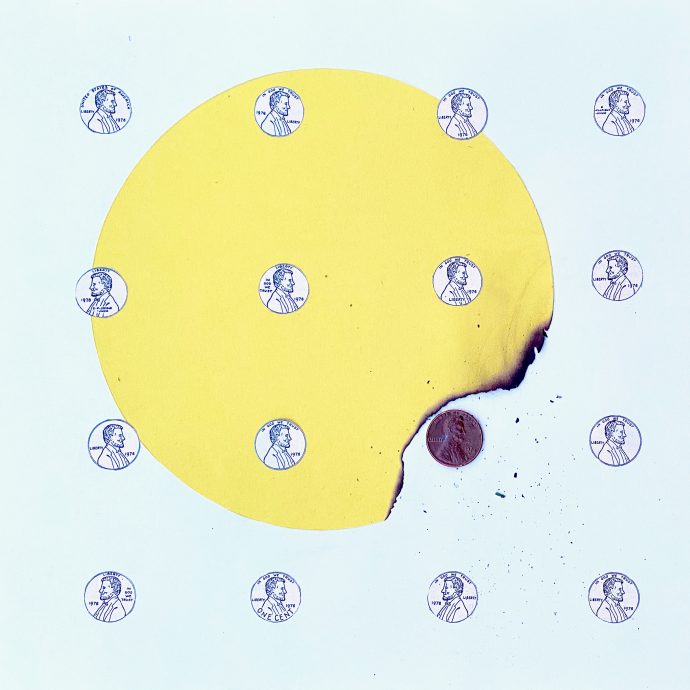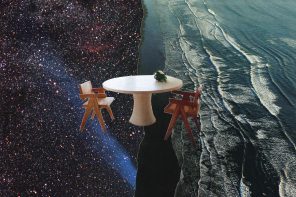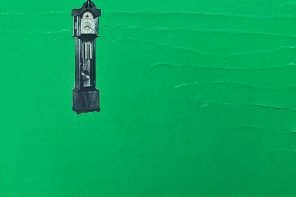Everyone I know is doing the test. The test. The one that has you send a plastic tube with your saliva to a DNA lab and you find out your ethnic makeup. My friends, my coworkers, my ultimate Frisbee teammates. They can’t stop talking about how they’re five percent Scandinavian and two percent Ashkenazi Jewish and 0.3 percent Sub-Saharan.
My parents think the test is pointless. They tell me so, the Sunday after I order a kit for myself. My wife, Darcy, and I are over at their place for lunch. “You like to waste money,” my mom says, shaking her head.
“I just don’t understand, Liam.” My dad always agrees with my mom. He met her while backpacking in India during his gap year and claims he fell in love with her at first sight, which I believe. “Are you worried about your history of family disease? Your mother and I are healthy as horses.”
I eat a steaming paratha my mom drops on my plate, sopping it with yogurt and freshly ground chutney. “It’s just something I want to do.”
On our way home, Darcy says my parents have a point. I drive one-handed, my right palm sliding up her sculpted thigh. She rolls a joint with slim fingers, takes a long toke and holds it to my lips. “That DNA test is just water cooler hype, babe,” she chides, “you know, like TikTok challenges.”
Darcy and I have been together for five years, married for two. She’s an outdoorsy type who posts a lot of Instagram pics of herself hiking and on “nature retreats,” captioned with Cheryl Strayed and Rupi Kaur quotations that keep her follower count well over a hundred thousand. Every time my friends ask how I bagged someone as hot as her, I shrug and say I got lucky swiping right on Tinder. The truth is Darcy’s long, clean hair and fitness instructor looks are just another life offering that I accept without question. Like my 401(k), or the air that I breathe.
“You’re not curious about who you are?” I ask her.
She laughs. “I know who I am. Don’t you?”
I don’t respond. Because I don’t know. I look back at my life and it’s as generic and simple as sugar-free gum. Boy Scouts and Little League as a kid. Trips to Disneyland and Cancun every winter, except one year when my mom took me to India to meet her relatives. A B-average all through high school, admission into my college of choice, losing my virginity during freshman rush week.
In my junior year of college, I took an acting class for shits. The instructor had us students share our traumas to get into character, our most secret of secrets. The others spoke of bouts with bulimia and abusive boyfriends and painkiller addictions, of mothers who pulled their hair and hit them with wooden spoons. The instructor simply nodded. When my turn came, I didn’t know what to say. “Nothing bad has happened to me.”
Hostility rose from the others in a wave. How dare you invade our safe space. And with their anger, uncertainty… and envy. “There has to be something,” the instructor insisted. “Any sad memory. A deceased pet?”
But I couldn’t think of anything. It confirmed what I’ve suspected for years—every time a friend or acquaintance gets a certain dismal look in their eye and confides in me for whatever reason, how their house burned down when they were a kid or their dad gambled away their college fund, how they were propositioned by their boss or linguistics professor. To which I respond, “That’s rough, man,” and awkwardly change the subject.
Maybe, just maybe, being average isn’t average at all.
There’s an edge to how ordinary I am. An almost sinister apathy that I can’t put a finger on and finally acknowledged a couple weeks back, at a funeral for one of my dad’s staunchly Midwestern cousins. I attended with Darcy and my parents, sitting in the back row of the drafty church, the minty smell of air freshener all around us. We had just heard the third or so weepy eulogy when I murmured without thinking, “He’s not getting any deader.”
Darcy stifled a snicker, but my mom immediately apologized to a few others who’d overheard. “Liam didn’t mean it. It’s his way of grieving, you know?” she explained with a mortified look that I knew too well. Later on, I tried explaining that I was under a lot of stress at work and said it before I could stop myself—which was partly true—and that Uncle Lafe was an asshole anyway. “Stop,” she said, cutting me off, and then bitterly asked why she had been cursed with me. “Sometimes I wonder if you’re even mine.”
Believe me, I wonder as well. It’s a big reason why I order the DNA test. I don’t know what I expect to find out. But, like I said, everyone else is doing it. I might as well, too.
The kit arrives on my doorstep, a shiny white box with rainbow graphics. I bring it inside where Darcy and a few of her influencer friends are drinking Chablis at the kitchen counter. She squeals when she sees it. “Ooh, let me? Pretty please?” She slits the seal and lifts the lid, examines the test tube inside, the others giggling.
“I thought you said it was water cooler hype.”
“It’s still exciting. Do the test now, Li. Will you?”
With the encouragement of her friends, I open the tube and spit in it, cap the tube and shake it for several seconds, seal it in the box. I drop it off at the post office the next morning on my way to work. And then I wait. Four weeks, five and then six. I refresh my email inbox again and again for my ancestry results. Nothing.
Finally, a phone call. An unknown number. “Hello?”
“Is this Liam Pendergast?” someone asks in a feminine voice, polite and precise.
“Speaking.”
They explain that they work at a lab with a hyphenated name full of syllables. “We’re calling about a DNA test you submitted?”
“I’ve been waiting to hear from you,” I say irritably. “I should have gotten my results a long time ago.”
“That’s why we’re calling. We did process your sample … or tried to.” The voice hesitates. “We couldn’t trace your ancestry. Your DNA is 100% unknown.”
“What?”
“Are you sure you followed the instructions step by step?” I say nothing, knowing that I damn well did to a T, the way I always do. “We’re happy to send another kit free of charge—”
“—it’s fine. Thanks for letting me know.”
I hang up.
In the days after the phone call, I detach. I go on autopilot. I subscribe to HBO and watch the latest season of Westworld, upgrade my Fitbit. Thursday, Ultimate Frisbee after work. On Saturday, I read a trending BuzzFeed article about butt play. I do an edible that night and eat my wife’s ass for the first time. Darcy says she doesn’t kiss and tell, but the next time her influencer buddies are over, they give me a knowing smile.
I tell myself the lab was right, that I didn’t do the test properly, or my pot smoking skewed the results. But I can’t stop thinking about what my mom said at my uncle’s funeral, which I’d more or less heard all my life. As a kid, every time I talked back or bugged her as she watched The Young and the Restless, which was often. She’d tell me that many Indian mothers pray to have boys, but she wanted a daughter. “The doctors told me you were a girl when they did my ultrasounds,” my mom would say, the same old tired grin creasing her hawklike face. “When you were born, I cried.”
And so, remembering this, I seek answers. I take my cue from straight-to-VOD horror movies and renew a library card that I haven’t touched since college. I sign out books on East Asian and Indigenous and European folktales, stories about witches and banshees and demons, clothbound texts with torn pages that I flip through late at night as Darcy sleeps, the glow from my bedside lamp tinting her gym shorts and T-shirt a reddish shade. I read about fairies who steal human babies from God-fearing families and replace them with deformed imps. I revisit Shakespeare’s A Midsummer Night’s Dream, which I studied in Honors English—Puck and Oberon and Titania, queen of the fairies, who happily raises an Indian prince she probably kidnapped, his heartbroken mother dying soon afterwards.
I’m halfway through the play when I call my mom at work one day during a smoke break. “Remember when you’d say you wanted me to be a girl, when I was a kid?” I ask, exhaling, struggling to keep an accusatory note out of my voice. “What’d you mean by that?”
“Oh, Liam.” She’s in the middle of doing laundry, her words garbled by her phone wedged between her cheek and shoulder. “That was so long ago. I was only teasing.”
“You weren’t, Mom. You cried when I was born. And what about at Uncle Lafe’s funeral, when you said you were cursed with me? That wasn’t long ago.”
“What does it matter?” She’s quiet and then sighs. “It’s just a feeling I have sometimes. Perhaps I should have kept it to myself.”
“What do you mean?”
“It started when I was pregnant with you. I would talk to you in my belly. I felt that I knew you. But when you were born, it seemed you didn’t belong to me, as though you were someone else’s. The doctors gave me pills for it. Post-partum depression, they said. But who knows?”
Or Titania’s doing.
How did the fairy queen pull it off? I imagine her sneaking into a hospital on the night that my birth is recorded. Buck naked, covered in twigs and mud, her cheeks and nose smeared with coal—she’s grudgingly accepted that her usual uniform of prairie gowns and flower crowns is more suited for Coachella. A sling over her shoulder with a small, squirming bundle that makes hissing noises. The demon baby that she plans to trade with an ordinary human one. But peeking into room after room, she realizes none of the hospital babies are ordinary. They sleep in tiny cots next to their mothers – the larger, more pathetic iterations of themselves. Titania sees the destinies of these children, these future addicts and victims of abuse and cancer. It gets worse—she sees their tormentors in the making, other babies who will one day manage pharmaceutical companies and trillion-dollar corporations and raise insurance premiums, pundits who will spout Nazi talking points while claiming that facts don’t care about feelings.
Titania looks at her bundle with disgust. The world is already a shithole—even for the very privileged. Who will even notice if she throws another demon in the mix? Times have changed, her old tricks are just that. For a moment, she considers heading home in defeat. But she’s not a quitter.
Inspiration strikes. She tiptoes to the nearest delivery room, where my sweaty, exhausted mom has been given an epidural and will give birth to a girl with her bird-of-prey features. My sister. A future climate change denier, maybe, or an anti-vaxxer who will shill essential oils and weight loss teas on social media. Titania waves a hand over her bundle. Its gnashing growls mellow into the gurgles of a basic newborn boy. My gurgles. She’ll switch me with my sister when my mom’s obstetrician isn’t looking. And the fairy queen hopes that her latest scheme will shake things up.
It does. In a roundabout way.
Three exes before Darcy, I dated a coworker, an activist-type who spent her free time volunteering at soup kitchens and at Planned Parenthood. She was cute, so I deleted my Tinder account for a time and donated to her various Facebook fundraisers and GoFundMe campaigns without being asked. Still, she unceremoniously dumped me after a few months for being entitled. “You make me feel like an ambulance chaser,” she said, defiant but apologetic. “I can’t explain it, but when I’m with you, it’s like the world is only bad because I want it to be. Like, I don’t even know who I am anymore.”
I finish reading A Midsummer Night’s Dream and wait for Darcy to ask about my test results, knowing she won’t. Her memory is like swiss cheese. I normally don’t mind—unlike my previous girlfriends, she’ll never win an argument with me by rubbing all the shitty things I ever said or did in my face. Lately though, I wish she’d pay more attention.
I finally mention the test when we’re driving to my parents’ place for Sunday lunch. Darcy cranks Cardi B on the Bluetooth stereo and opens our SUV sunroof, her hair bannering in the hot wind. I rest my hand on her knee—she’s wearing yoga pants today—and decide to hold off on telling her, until tomorrow morning at least, but she asks what’s on my mind. So I pull over. I talk about the phone call from the lab, the library books, the acting class I took and my uncle’s funeral, my conversation with my mom.
As soon as I finish, Darcy bursts out laughing. “So that’s what’s been bothering you? Come on, babe. None of it means anything. You know that.”
“But—”
“Look, the lab made a mistake and didn’t want to admit it. All the other stuff is reaching. Really, really reaching.” Her voice softens. “I never knew you were superstitious. It’s adorable.”
“Doesn’t it bother that that I’m so … normal?”
“That’s what I love about you.”
“But others in the world are suffering.”
“You could do what Hollywood celebrities did during COVID?” She grins. “You know, sing John Lennon songs on Instagram to make them feel better?”
“I’m serious, Darcy. When people see someone like me, they forget about the big picture. They want to be comfortable, too, instead of making the world better for everyone.”
“It’s not like you’re doing it on purpose, Li. There’s no point feeling guilty. You do your best. That’s all anyone can hope for.” She squeezes my hand. “Can we get Dairy Queen later? I want ice cream.”
We return from my parents’ place late in the afternoon. Darcy and I share a pineapple banana split while we vape and rewatch The Dark Knight on Netflix. As Heath Ledger mugs and smirks on our flatscreen TV, I think about how we want bad guys to be the Joker, nihilistic psychopaths who raise hell for the sake of it. But they’re self-aware enough to know what they are… and clear about their intentions. Forces of good will always oppose them. It’s pure physics.
What if—and hear me out—the real demons are people who don’t mean harm and are as good as they need to be, who sidestep the ugliness and messiness of the world with the ease of a buzzed college kid navigating a frat house? People whose existence seems to prove that evil is no biggie and can be swept under the carpet. That life is what you make of it.
People like me.
Suri Parmar is a writer, filmmaker, professor, and self-proclaimed agent’s nightmare who doesn’t limit her storytelling to one particular medium or genre. Her fiction has appeared in New Haven Review and Crannóg magazine and her short films have screened around the world. You can check out her creative portfolio at scumoftheearth.ca.




